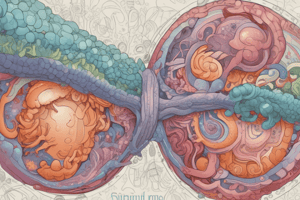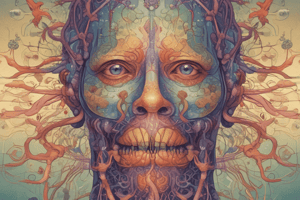Podcast
Questions and Answers
What is a characteristic of autoimmune diseases?
What is a characteristic of autoimmune diseases?
- Immediate tissue repair
- Chronic inflammation (correct)
- Acute inflammation
- Complete organ function restoration
Which type of autoimmune disease affects the pancreas?
Which type of autoimmune disease affects the pancreas?
- Sjögren's syndrome
- Type 1 diabetes (correct)
- Lupus
- Rheumatoid arthritis
What is a potential trigger for autoimmune diseases?
What is a potential trigger for autoimmune diseases?
- Infections (correct)
- Healthy diet
- Vaccination
- Regular exercise
What is the role of autoreactive T cells in autoimmune diseases?
What is the role of autoreactive T cells in autoimmune diseases?
What is a common feature of autoimmune diseases?
What is a common feature of autoimmune diseases?
What is a potential treatment for autoimmune diseases?
What is a potential treatment for autoimmune diseases?
What is the result of cytokine imbalance in autoimmune diseases?
What is the result of cytokine imbalance in autoimmune diseases?
How are autoimmune diseases typically diagnosed?
How are autoimmune diseases typically diagnosed?
Flashcards are hidden until you start studying
Study Notes
Autoimmune Diseases
Definition
- Autoimmune diseases occur when the immune system fails to distinguish between self and non-self, leading to an immune response against the body's own cells, tissues, and organs.
Characteristics
- Chronic inflammation
- Tissue damage
- Loss of organ function
- Genetic predisposition
Types of Autoimmune Diseases
- Organ-specific:
- Type 1 diabetes (pancreas)
- Hashimoto's thyroiditis (thyroid gland)
- Graves' disease (thyroid gland)
- Pernicious anemia (stomach)
- Non-organ specific:
- Rheumatoid arthritis (joints)
- Lupus (multiple organs)
- Sjögren's syndrome (exocrine glands)
- Multiple sclerosis (central nervous system)
Causes and Triggers
- Genetic factors: genetic predisposition, gene-environment interactions
- Environmental factors: infections, toxins, stress, hormonal imbalances
- Immunological factors: immune system dysregulation, T cell or B cell abnormalities
Pathogenesis
- Activation of autoreactive T cells: T cells that recognize self-antigens
- Production of autoantibodies: B cells produce antibodies against self-antigens
- Cytokine imbalance: pro-inflammatory cytokines dominate anti-inflammatory cytokines
- Inflammation and tissue damage: immune response leads to tissue damage and organ dysfunction
Diagnosis and Treatment
- Diagnosis: combination of clinical features, laboratory tests, and imaging studies
- Treatment: depends on the specific disease, may include:
- Immunosuppressive drugs
- Corticosteroids
- Biological therapies (e.g., anti-TNF agents)
- Plasmapheresis
- Organ transplantation
Autoimmune Diseases
Definition
- Occur when the immune system fails to distinguish between self and non-self, leading to an immune response against the body's own cells, tissues, and organs.
Characteristics
- Chronic inflammation is a hallmark of autoimmune diseases.
- Tissue damage and loss of organ function are common consequences.
- Genetic predisposition plays a significant role in autoimmune diseases.
Types of Autoimmune Diseases
Organ-Specific Diseases
- Type 1 diabetes targets the pancreas.
- Hashimoto's thyroiditis and Graves' disease affect the thyroid gland.
- Pernicious anemia affects the stomach.
Non-Organ Specific Diseases
- Rheumatoid arthritis affects the joints.
- Lupus can affect multiple organs.
- Sjögren's syndrome targets exocrine glands.
- Multiple sclerosis affects the central nervous system.
Causes and Triggers
- Genetic factors contribute to autoimmune diseases through genetic predisposition and gene-environment interactions.
- Environmental factors, such as infections, toxins, stress, and hormonal imbalances, can trigger autoimmune diseases.
- Immunological factors, including immune system dysregulation and T cell or B cell abnormalities, can lead to autoimmune diseases.
Pathogenesis
- Autoreactive T cells are activated, recognizing self-antigens as foreign.
- B cells produce autoantibodies against self-antigens.
- Cytokine imbalance leads to a pro-inflammatory response, causing tissue damage.
- Inflammation and tissue damage ultimately result in organ dysfunction.
Diagnosis and Treatment
- Diagnosis involves a combination of clinical features, laboratory tests, and imaging studies.
- Treatment options vary depending on the specific disease, but may include:
- Immunosuppressive drugs to reduce the immune response.
- Corticosteroids to reduce inflammation.
- Biological therapies, such as anti-TNF agents, to target specific inflammatory pathways.
- Plasmapheresis to remove autoantibodies from the blood.
- Organ transplantation in severe cases.
Studying That Suits You
Use AI to generate personalized quizzes and flashcards to suit your learning preferences.





